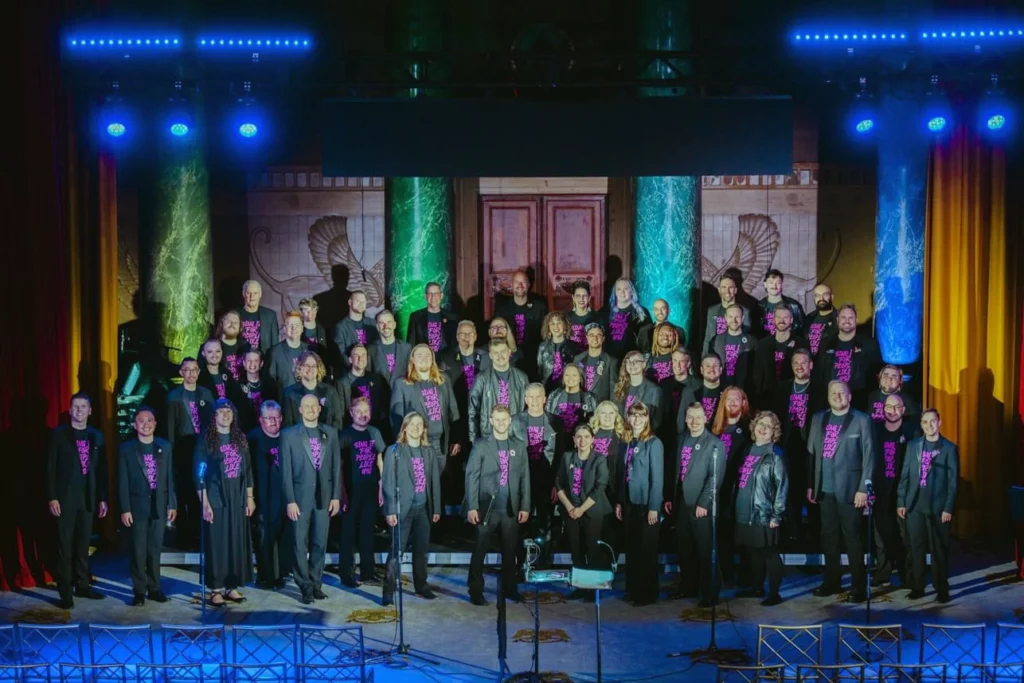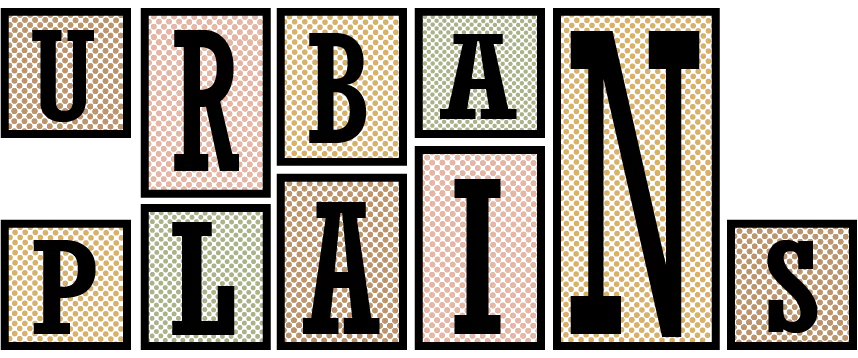Explore the diverse voices and stories behind inclusive LGBTQ choirs thriving in the Midwest.

In the grandeur of the vast concert hall of Des Moines’s Scottish Rite Consistory, where tall ceilings and soft, ambient light grace the space, an air of palpable anticipation saturates every corner. Excitement crackles through the audience. All attention converges towards the stage.
Suddenly, the hall falls into darkness, and a hushed silence descends as the curtain begins its ascent. With a gradual unveiling, the stage reveals a chorus, with members young and old. Their collective voice resonates through the hall, a captivating blend of emotion and fervor that draws the audience into their story. Amidst the harmonious melodies, smiles exchange between performers and spectators.
Living as an openly gay man, Doug Staudt joined the Des Moines Gay Men’s Chorus (DMGMC) to find community after moving to Iowa’s capital city in 2012. It’s been over a decade since then. He’s found a sense of belonging with the DMGMC, and a place to express himself freely through music.
Being a part of this choir is not just about singing together—it’s about finding strength in unity and using music as a tool for social change. The DMGMC spreads messages of love, acceptance, and equality to audiences far and wide. They use their voices not only to entertain but also to educate and advocate for LGBTQ+ rights and visibility within their communities. The choir, regardless of its namesake, is open for anyone to join who can sing in the tenor and bass ranges.
“A lot of people are rejected by their families and don’t have a place to call home after they come out and live their authentic lives,” Staudt says. “Being able to provide that safe space for people that don’t have an otherwise safe space to be is a key component of what we do.”
Devon Walker felt the same way when he joined the choir. He needed that community. “I was going through a really rough personal time with family and personal issues. And I just needed a space of queer folks that I can be around,” Walker says. “We are a community that does care about each other.”
Involvement of LGBTQ+ individuals doesn’t stop at the performers in the chorus. For many performances, the chorus commissions LGBTQ+ composers and choreographers to craft the song and dance for a concert. In 2021, the DMGMC performed Unbreakable by Andrew Lippa, a gay composer. The composition details LGBTQ activism in the U.S. in the 20th century.
Their performance catalog consists of arrangements that delve into profound themes such as bullying, suicide awareness, and the struggles of the LGBTQ+ community. By telling personal stories intertwined with song, each piece they perform is transformed to align with LGBTQ+ experiences. In their March concert, the DMGMC performed a catalog of songs by artist Kelly Clarkson.
“One of those songs, Dark Side, talked about going through divorce and not being able to love yourself and love other people. It was a particularly personal story for her,” Staudt says. “We all live with a dark space within ourselves and how do we overcome that and become better people for ourselves and for the community.”
Finding Connection Amongst Opposition
It’s a difficult time to be queer in Iowa. The Iowa LGBTQ+ community has faced significant challenges posed by aggressive legislative measures in the state. According to One Action Iowa, 29 anti-LGBTQ+ bills were introduced in 2023 alone. Bills that have been passed include Senate Study Bill 1197, that would ban gender-affirming care for transgender minors, and Senate File 482, which bans transgender youth from using bathrooms that align with their gender identity. Both have elicited concern among LGBTQ+ advocates and allies.
That’s where the DMGMC comes in. It provides a space for LGBTQ+ individuals and allies to seek support, connection, and affirmation amidst ongoing challenges to their rights.
In April, the DMGMC hosted their second annual Pride Youth Festival Chorus. Encouraging attendance from LGBTQ+ high school singers, the event included a performance by the students and the DMGMC and a discussion with local organizations about issues currently facing the community.
The chorus is also the home of the Out in the Schools program, which is a free course that encourages local school staff to learn about LGBTQ+ history and student support. The DMGMC also engages in local activism, such as their participation in the 2023 Iowa Queer Student Alliance protest against anti-LGBTQ+ legislation.
“We do a lot of things around activism, being present at rallies at the Capitol, being vocal, being present as a group and for each other,” Staudt says.
Another chorus in the Midwest with a similar mission is the Twin Cities Gay Men’s Chorus (TCGMC). When Kevin Stocks, its current executive director, joined the chorus in 2019, he was looking for an outlet for his lifelong love of music. However, he found much more.
“What I didn’t expect and was impressed by was all the various ways that TCGMC served its membership beyond musical engagement,” Stocks says. “There were many opportunities for members to get involved as volunteers and as leaders, which created a deeper sense of belonging and community.”
Being involved in the community and being a beacon of positive representation is essential to both choruses. While the state of Minnesota has not been as hostile as Iowa to the LGBTQ+ community, the TCGCM still finds ways to be involved.
“For me, some of the most rewarding experiences have been the outreach opportunities, whether that be performing the national anthem at professional sporting events or singing at schools to be a positive visible example of the LGBTQ+ community,” Stocks says.
